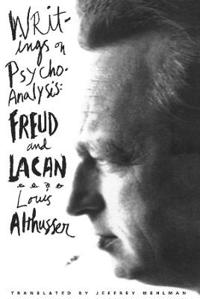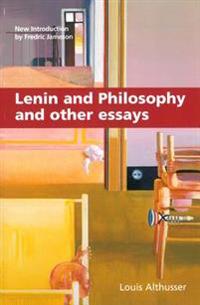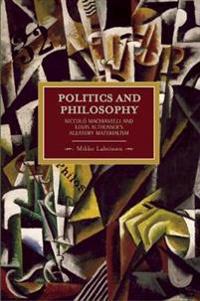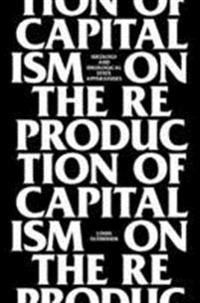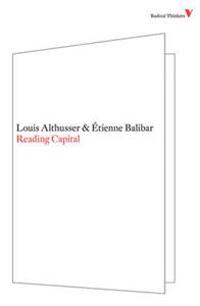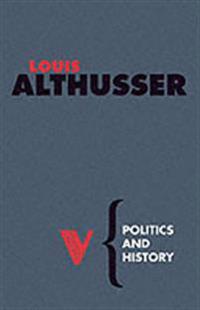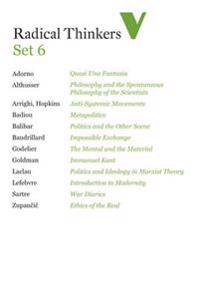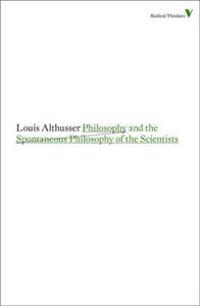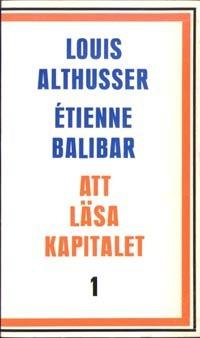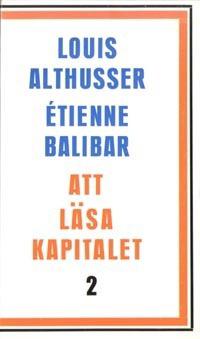Writings on Psychoanalysis (Häftad)
avLouis Althusser
ISBN: 9780231101691 - UTGIVEN: 199902A prominent member of the French structuralist movement, Louis Althusser was influential for reinvigorating Marxist thought in France in the 196Os with celebrated works such as For Marx and Reading Capital. Yet many readers are not as familiar with the profound impact of psychoanalysis on Althusser'[...]
Louis Althusser
ISBN: 9780333918999 - UTGIVEN: 2003-06The publication of Louis Althusser's autobiography, The Future Lasts Forever, shattered the myth of Althusser as austere structural Marxist. It not only illuminated the private life of this public thinker, but suggested that his previously published works could be read very differently. Louis Althus[...]
Louis Althusser (Storpocket)
avLuke Ferretter
ISBN: 9780415327329 - UTGIVEN: 200511Best known for his theories of ideology and its impact on politics and culture, Louis Althusser revolutionized Marxist theory. His writing changed the face of literary and cultural studies, and continues to influence political modes of criticism such as feminism, postcolonialism and queer theory. Be[...]
Lenin and Philosophy and Other Essays (Pocket)
avLouis Althusser, Frederic Jameson, Ben Brewster
ISBN: 9781583670392 - UTGIVEN: 200110Politics And Philosophy: Niccolo Machiavelli And Louis Althusser's Aleatory Materialism (häftad)
ISBN: 9781608461233 - UTGIVEN: 2011-04On the Reproduction of Capitalism (Häftad)
avProfessor Louis Althusser
ISBN: 9781781681640 - UTGIVEN: 2014-02What is perhaps Louis Althusser's most famous text, "Ideology and Ideological State Apparatuses," published in 1970 and very influential ever since, was an extract of a much longer book published in French years after his death. Published now for the first time in English, "On the Reproduction of Ca[...]
For Marx (Häftad)
avLouis Althusser
ISBN: 9781844670529 - UTGIVEN: 200510A milestone in the development of post-war Marxist thought.
On Ideology (Häftad)
avLouis Althusser
ISBN: 9781844672028 - UTGIVEN: 200712The publication For Marx and Reading Capital established Louis Althusser as one of the most controversial figures in the Western Marxist tradition, and one of the most influential renewals of Marxist thought. Collected here are Althusser s most significant philosophical writings from the late sixtie[...]
Reading Capital (Häftad)
avLouis Althusser, Etienne Balibar
ISBN: 9781844673476 - UTGIVEN: 200905Reading Capital is an attempt to topple the entire edifice of Western Marxism, and rebuild it from the original foundations. Establishing a rigorous program of symptomatic reading that cuts through the silences and lacunae of Capital to reveal its philosophical core, Louis Althusser interprets Marx [...]
Philosophy of the Encounter (Häftad)
avLouis Althusser, Francois Matheron, Oliver Corpet
ISBN: 9781844675531 - UTGIVEN: 200605In the late 1970s and 1980s, Louis Althusser endured a period of intense mental instability during which he murdered his wife and was committed to a psychiatric hospital. Spanning this deeply troubling period, this fourth and final volume of political and philosophical writings reveals Althusser wre[...]
Politics and History (Häftad)
avLouis Althusser
ISBN: 9781844675722 - UTGIVEN: 200612In the first two essays of this book, Louis Althusser analyses the work of two of the greatest thinkers of the Enlightenment - Montesquieu and Rousseau. He shows that although they made considerable advances towards establishing a science of politics, particularly in comparison with the theorists of[...]
For Marx (Inbunden)
avLouis Althusser
ISBN: 9781844676620 - UTGIVEN: 2010-10A milestone in postwar Marxist thought, containing Althusser's influential arguments on the epistemological break and anti-humanism[...]
Machiavelli and Us (Häftad)
avLouis Althusser
ISBN: 9781844676750 - UTGIVEN: 2010-12"We do not publish our own drafts, that is, our own mistakes, but we do sometimes publish other people's," Louis Althusser once observed of Marx's early writings. Among his own posthumously released drafts, one, at least, is incontestably neither mistake nor out-take: the text of his lecture course [...]
Radical Thinkers Set 6 (Pocket)
avLouis Althusser, Gregory Elliott, Ben Brewster
ISBN: 9781844677801 - UTGIVEN: 201202This sixth batch features some of the best authors in the Verso canon, including Theodor Adorno, Jean-Paul Sartre, Jean Baudrillard and Henri Lefebvre. It also includes long out of print titles by authors experiencing a renaissance such as Lucien Goldmann and Maurice Godelier. These are beautifully [...]
Philosophy and the Spontaneous Philosophy of the Scientists (Häftad)
avLouis Althusser
ISBN: 9781844677894 - UTGIVEN: 201201Collected here are Althusser's most significant philosophical writings from 1965 to 1978. Intended to contribute, in his own words, to a "left-wing critique of Stalinism that would help put some substance back into the revolutionary project here in the West," they are the record of a shared history.[...]
Att läsa Kapitalet. 1 (Häftad)
avLouis Althusser
ISBN: 9789150401035 - UTGIVEN: 197001Innehåll:
Inledning
Från Kapitalet till Marx filosofi
Kapitalets objekt (Inledning; Marx och hans upptäckter; Den klassiska ekonomins förtjänster; Den klassiska ekonomins brister: Skiss till begreppet historisk tid; Marxismen är inte en historicism)[...]Att läsa Kapitalet. 2 (Häftad)
avLouis Althusser
ISBN: 9789150401042 - UTGIVEN: 197001Innehåll:
Kapitalets objekt, forts. (Vetenskapsteoretiska satser i Kapitalet; Den politiska ekonomins objekt; Marx kritik; Marx väldiga teoretiska revolution; Appendix: Det ideala genomsnittet och övergångsformerna
den historiska materialismens grundläggande begrepp (Från[...]

